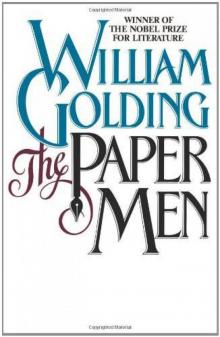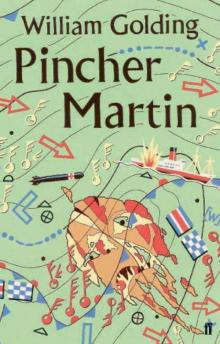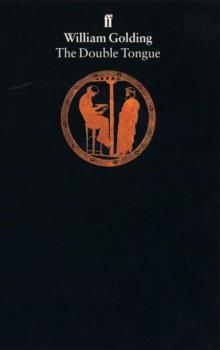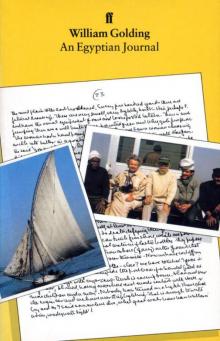- Home
- William Golding
Rites of Passage Page 2
Rites of Passage Read online
Page 2
EDMUND TALBOT
(2)
I have placed the number “2” at the beginning of this entry though I do not know how much I shall set down today. Circumstances are all against careful composition. There has been so little strength in my limbs—the prive-house, the loo—I beg its pardon, I do not know what it should be called since in strict sea-language the heads are at the forward end of the vessel, the young gentlemen should have a roundhouse and the lieutenants should have—I do not know what the lieutenants should have. The constant movement of the vessel and the need constantly to adjust my body to it—
Your lordship was pleased to recommend that I should conceal nothing. Do you not remember conducting me from the library with a friendly arm across my shoulder, ejaculating in your jovial way, “Tell all, my boy! Hold nothing back! Let me live again through you!” The devil is in it, then, I have been most confoundedly seasick and kept my bunk. After all, Seneca off Naples was in my predicament was he not—but you will remember—and if even a stoic philosopher is reduced by a few miles of lumpy water, what will become of all us poor fellows on higher seas? I must own to have been reduced already to salt tears by exhaustion and to have been discovered in such a womanish state by Wheeler! However, he is a worthy fellow. I explained my tears by my exhaustion and he agreed cheerfully.
“You, sir,” said he, “would hunt all day and dance all night at the end of it. Now if you was to put me, or most seamen, on a horse, our kidneys would be shook clear down to our knees.”
I groaned some sort of answer, and heard Wheeler extract the cork from a bottle.
“Consider, sir,” said he, “it is but learning to ride a ship. You will do that soon enough.”
The thought comforted me; but not as much as the most delectable odour which came o’er my spirits like the warm south. I opened my eyes and lo, what had Wheeler done but produce a huge dose of paregoric? The comfortable taste took me straight back to the nursery and this time with none of the melancholy attendant on memories of childhood and home! I sent Wheeler away, dozed for a while then slept. Truly, the poppy would have done more for old Seneca than his philosophy!
I woke from strange dreams and in such thick darkness that I knew not where I was but recollected all too soon and found our motion sensibly increased. I shouted at once for Wheeler. At the third shout—accompanied I admit with more oaths than I generally consider consistent with either common sense or gentlemanly conduct—he opened the door of my hutch.
“Help me out of here, Wheeler! I must get some air!”
“Now you lie still for a while, sir, and in a bit you’ll be right as a trivet! I’ll set out a bowl.”
Is there, can there be, anything sillier, less comforting than the prospect of imitating a trivet? I saw them in my mind’s eye as smug and self-righteous as a convocation of Methodists. I cursed the fellow to his face. However, in the upshot he was being reasonable enough. He explained that we were having a blow. He thought my greatcoat with the triple capes too fine a garment to risk in flying salt spray. He added, mysteriously, that he did not wish me to look like a chaplain! He himself, however, had in his possession an unused suit of yellow oilskin. Ruefully enough, he said he had bought it for a gentleman who in the event had never embarked. It was just my size and I should have it for no more than he had given for it. Then at the end of the voyage I might sell it back to him at second hand if I chose. I closed there and then with this very advantageous offer, for the air was stifling me and I longed for the open. He eased and tied me into the suit, thrust India rubber boots on my feet and adjusted an oilskin hat on my head. I wish your lordship could have seen me for I must have looked a proper sailor, no matter how unsteady I felt! Wheeler assisted me into the lobby, which was running with water. He kept up his prattle as, for example, that we should learn to have one leg shorter than the other like mountain sheep. I told him testily that since I visited France during the late peace, I knew when a deck was atilt, since I had not walked across on the water. I got out into the waist and leaned against the bulwarks on the larboard, that is the downward, side of the deck. The main chains and the huge spread of the ratlines—oh Falconer, Falconer!—extended above my head, and above that a quantity of nameless ropes hummed and thrummed and whistled. There was an eye of light showing still, but spray flew over from the high, starboard side and clouds that raced past us seemed no higher than the masts. We had company, of course, the rest of the convoy being on our larboard hand and already showing lights, though spray and a smoky mist mixed with rain obscured them. I breathed with exquisite ease after the fetor of my hutch and could not but hope that this extreme, even violent, weather would blow some of the stench out of her. Somewhat restored I gazed about me, and found for the first time since the anchor was raised my intellect and interest reviving. Staring up and back, I could see two helmsmen at the wheel, black, tarpaulined figures, their faces lighted from below as they glanced alternately into the illuminated compass, then up at the set of the sails. We had few of these spread to the wind and I supposed it was due to the inclemency of the weather but learnt later from Wheeler—that walking Falconer—that it was so we should not run clear away from the rest of the convoy since we “have the legs” of all but a few. How he knows, if indeed he knows, is a mystery, but he declares we shall speak the squadron off Ushant, detach our other ship of the line to them, take over one of theirs, be convoyed by her to the latitude of Gibraltar after which we proceed alone, secured from capture by nothing but the few guns we have left and our intimidating appearance! Is this fair or just? Do their lordships not realize what a future Secretary of State they have cast so casually on the waters? Let us hope that like the Biblical bread they get me back again! However, the die is cast and I must take my chance. I stayed there, then, my back to the bulwark, and drank the wind and rain. I concluded that most of my extraordinary weakness had been due more to the fetor of the hutch than to the motion of the vessel.
There were now the veriest dregs of daylight but I was rewarded for my vigil by sight of the sickness I had escaped. There emerged from our lobby into the wind and rain of the waist, a parson! I supposed he was the same fellow who had tried to ask a blessing on our first dinner and been heard by no one but the Almighty. He wore knee-breeches, a long coat and bands that beat in the wind at his throat like a trapped bird at a window! He held his hat and wig crushed on with both hands and he staggered first one way, then the other, like a drunken crab. (Of course your lordship has seen a drunken crab!) This parson turned, like all people unaccustomed to a tilted deck, and tried to claw his way up it rather than down. He was, I saw, about to vomit, for his complexion was the mixed pallor and greenness of mouldy cheese. Before I could shout a warning he did indeed vomit, then slid down to the deck. He got on his knees—not, I think, for the purpose of devotion!—then stood at the very moment when a heave from the ship gave the movement an additional impetus. The result was he came, half-running, half-flying down the deck and might well have gone clean through the larboard ratlines had I not grabbed him by the collar! I had a glimpse of a wet, green face, then the servant who performs for the starboard passengers the offices that our Wheeler performs for the larboard ones rushed out of the lobby, seized the little man under the arms, begged my pardon and lugged him back out of sight. I was damning the parson for befouling my oilskins when a heave, shudder and convenient spout of mixed rain and sea water cleaned him off me. For some reason, though the water stung my face it put me in a good humour. Philosophy and religion—what are they when the wind blows and the water gets up in lumps? I stood there, holding on with one hand, and began positively to enjoy all this confusion, lit as it was by the last lees of light. Our huge old ship with her few and shortened sails from which the rain cascaded was beating into this sea and therefore shouldering the waves at an angle, like a bully forcing his way through a dense crowd. And as the bully might encounter here and there a like spirit, so she (our ship) was hindered now and then, or dropped or lifted or, it
may be, struck a blow in the face that made all her forepart, then the waist and the afterdeck to foam and wash with white water. I began, as Wheeler had put it, to ride a ship. Her masts leaned a little. The shrouds to windward were taut, those to leeward slack, or very near it. The huge cable of her mainbrace swung out to leeward between the masts; and now here is a point which I would wish to make. Comprehension of this vast engine is not to be come at gradually nor by poring over diagrams in Marine Dictionaries! It comes, when it comes, at a bound. In that semi-darkness between one wave and the next I found the ship and the sea comprehensible not merely in terms of her mechanical ingenuity but as a—a what? As a steed, a conveyance, a means working to an end. This was a pleasure that I had not anticipated. It was, I thought with perhaps a touch of complacency, quite an addition to my understanding! A single sheet, a rope attached to the lower and leeward corner of a sail, was vibrating some yards above my head, wildly indeed, but understandably! As if to reinforce the comprehension, at the moment when I was examining the rope and its function there came a huge thud from forward, an explosion of water and spray, and the rope’s vibration changed—was halved at the mid-point so that for a while its length traced out two narrow ellipses laid end to end—illustrated, in fact, the first harmonic, like that point on a violin string which if touched accurately enough will give the player the note an octave above the open one.
But this ship has more strings than a violin, more than a lute, more I think than a harp, and under the wind’s tuition she makes a ferocious music. I will own that after a while I could have done with human company, but the Church has succumbed and the Army too. No lady can possibly be anywhere but in her bunk. As for the Navy—well, it is literally in its element. Its members stand here and there encased in tarpaulin, black with faces pale only by contrast. At a little distance they resemble nothing so much as rocks with the tide washing over them.
When the light had quite faded I felt my way back to my hutch and shouted for Wheeler, who came at once, got me out of my oilskins, hung the suit on the hook where it at once took up a drunken angle. I told him to bring me a lamp but he told me it was not possible. This put me in a temper but he explained the reason well enough. Lamps are dangerous to us all since once overset there is no controlling them. But I might have a candle if I cared to pay for it since a candle dowses itself when it falls, and in any case I must take a few safety measures in the management of it. Wheeler himself had a supply of candles. I replied that I had thought such articles were commonly obtained from the purser. After a short pause Wheeler agreed. He had not thought I would wish to deal directly with the purser who lived apart and was seldom seen. Gentlemen used not to have any traffic with him but employed their servants who ensured that the transaction was honest and above board. “For,” said he, “you know what pursers are!” I agreed with an air of simplicity which in an instant—you observe, sir, that I was coming to myself—concealed a revised estimate of Mr Wheeler, his fatherly concern and his willingness to serve me! I made a mental note that I was determined always to see round and through him farther than he supposed that he saw round and through me. So by eleven o’clock at night—six bells according to the book—behold me seated at my table-flap with this journal open before me. But what pages of trivia! Here are none of the interesting events, acute observations and the, dare I say, sparks of wit with which it is my first ambition to entertain your lordship! However, our passage is but begun.
(3)
The third day has passed with even worse weather than the others. The state of our ship, or that portion of it which falls under my notice, is inexpressibly sordid. The deck, even in our lobby, streams with sea water, rain, and other fouler liquids, which find their way inexorably under the batten on which the bottom of the hutch door is supposed to close. Nothing, of course, fits. For if it did, what would happen in the next minute when this confounded vessel has changed her position from savaging the summit of a roller to plunging into the gulf on the other side of it? When this morning I had fought my way into the dining saloon—finding, by the way, nothing hot to drink there—I was unable for a while to fight my way out again. The door was jammed. I rattled the handle peevishly, tugged at it, then found myself hanging from it as she (the monstrous vessel has become “she” as a termagant mistress) she lurched. That in itself was not so bad but what followed might have killed me. For the door snapped open so that the handle flashed in a semicircle with a radius equal to the width of the opening! I saved myself from fatal or serious injury by the same instinct that drops a cat always on its feet. This alternate stiffness then too easy compliance with one’s wishes by a door—one of those necessary objects in life on which I had never before bestowed much interest—seemed to me so animated a piece of impertinence on the part of a few planks of wood I could have believed the very genii, the dryads and hamadryads of the material from which our floating box is composed, had refused to leave their ancient dwelling and come to sea with us! But no—it was merely—“merely”—dear God what a world!—the good ship doing what Bates called “rendering like an old boot”.
I was on all fours, the door having been caught neatly against the transverse or thwartships bulkhead (as Falconer would have it) by a metal springhook, when a figure came through the opening that set me laughing crazily. It was one of our lieutenants and he stumped along casually at such an angle to the deck—for the deck itself was my plane of reference—that he seemed to be (albeit unconsciously) clownish and he put me in a good humour at once for all my bruises. I climbed back to the smaller and possibly more exclusive of the two dining tables—that one I mean set directly under the great stern window—and sat once more. All is firmly fixed, of course. Shall I discourse to your lordship on “rigging screws”? I think not. Well then, observe me drinking ale at the table with this officer. He is one Mr Cumbershum, holding the King’s Commission and therefore to be accounted a gentleman though he sucked in his ale with as nauseating an indifference to polite usage as you would find in a carter. He is forty, I suppose, with black hair cut short but growing nearly down to his eyebrows. He has been slashed over the head and is one of our heroes, however unformed his manners. Doubtless we shall hear that story before we have done! At least he was a source of information. He called the weather rough but not very. He thought those passengers who were staying in their bunks—this with a meaning glance at me—and taking light refreshment there, were wise, since we have no surgeon and a broken limb, as he phrased it, could be a nuisance to everyone! We have no surgeon, it appears, because even the most inept of young sawbones can do better for himself ashore. It is a mercenary consideration that gave me a new view of what I had always considered a profession with a degree of disinterestedness about it. I remarked that in that case we must expect an unusual incidence of mortality and it was fortunate we had a chaplain to perform all the other rites, from the first to the last. At this, Cumbershum choked, took his mouth away from the pot and addressed me in tones of profound astonishment.
“A chaplain, sir? We have no chaplain!”
“Believe me, I have seen him.”
“No, sir.”
“But law requires one aboard every ship of the line does it not?”
“Captain Anderson would wish to avoid it; and since parsons are in as short supply as surgeons it is as easy to avoid the one as it is difficult to procure the other.”
“Come, come, Mr Cumbershum! Are not seamen notoriously superstitious? Do you not require the occasional invocation of Mumbo Jumbo?”
“Captain Anderson does not, sir. Nor did the great Captain Cook, I would have you know. He was a notable atheist and would as soon have taken the plague into his ship as a parson.”
“Good God!”
“I assure you, sir.”
“But how—my dear Mr Cumbershum! How is order to be maintained? You take away the keystone and the whole arch falls!”
Mr Cumbershum did not appear to take my point. I saw that my language must not be figurative w
ith such a man and rephrased.
“Your crew is not all officers! Forward there, is a crowd of individuals on whose obedience the order of the whole depends, the success of the voyage depends!”
“They are well enough.”
“But sir—just as in a state the supreme argument for the continuance of a national church is the whip it holds in one hand and the—dare I say—illusory prize in the other, so here—”
But Mr Cumbershum was wiping his lips with the brown back of his fist and getting to his feet.
“I don’t know about all that,” he said. “Captain Anderson would not have a chaplain in the ship if he could avoid it—even if one was on offer. The fellow you saw was a passenger and, I believe, a very new-hatched parson.”
I remembered how the poor devil had clawed up the wrong side of the deck and spewed right in the eye of the wind.
“You must be right, sir. He is certainly a very new-hatched seaman!”
I then informed Mr Cumbershum that at a convenient time I must make myself known to the captain. When he looked surprised I told him who I am, mentioned your lordship’s name and that of His Excellency your brother and outlined the position I should hold in the governor’s entourage—or as much as it is politic to outline, since you know what other business I am charged with. I did not add what I then thought. This was that since the deputy-governor is a naval officer, if Mr Cumbershum was an average example of the breed I should give the entourage some tone it would stand in need of!
My information rendered Mr Cumbershum more expansive. He sat down again. He owned he had never been in such a ship or on such a voyage. It was all strange to him and he thought to the other officers too. We were a ship of war, store ship, a packet boat or passenger vessel, we were all things, which amounted to—and here I believe I detected a rigidity of mind that is to be expected in an officer at once junior and elderly—amounted to being nothing. He supposed that at the end of this voyage she would moor for good, send down her top masts and be a sop to the governor’s dignity, firing nothing but salutes as he went to and fro.

 Lord of the Flies
Lord of the Flies To the Ends of the Earth
To the Ends of the Earth Free Fall
Free Fall The Paper Men
The Paper Men The Spire
The Spire The Scorpion God: Three Short Novels
The Scorpion God: Three Short Novels The Inheritors
The Inheritors Darkness Visible: With an Introduction by Philip Hensher
Darkness Visible: With an Introduction by Philip Hensher Pincher Martin
Pincher Martin The Pyramid
The Pyramid The Double Tongue
The Double Tongue An Egyptian Journal
An Egyptian Journal Rites of Passage
Rites of Passage Envoy Extraordinary
Envoy Extraordinary